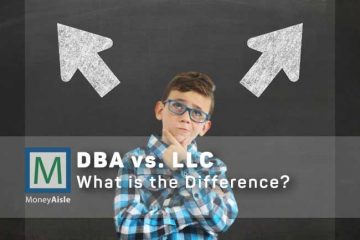Choosing between an LLC or an S corp for your startup can have a significant impact on your business success. That is why, knowing the difference is imparative. And this guide will help you learn the difference and implication of choosing any of these structures.
Generally, entrepreneurs assume the tax structure makes S Corp and LLC stand apart, which is a wrong perception. If an LLC can opt to be taxed as an S corporation (pass-through entity), what exactly makes them discrete entities?
While forming an LLC as entreprenuer, you are stuck between S Corporation vs. LLC, do not worry. In this article, we have tried to make you familiar with both business structures, their difference, similarities, advantages, and disadvantages over each other. Hence, before you choose any of them, make sure you read this article until the end and choose accordingly.
What is an S Corporation?
An S corporation (S corp) is a subchapter of a corporation whose shareholders (owners) elect to be taxed as a pass-through tax entity by the Internal Revenue Service (IRS). As a consequence, an S corp shareholders pay their taxes on the individual tax returns.
An S corp is a small, closely-held corporation with no more than 100 shareholders, can have only one class of stock, and the shareholders can only be individuals and not businesses such as other corporations, LLCs, partnerships, or resident aliens. In addition, an S corp has to follow strict formation guidelines and must conduct corporate formalities required under state law.
What is a Limited Liability Company (LLC)?
An LLC is a legal business entity organized under state statutes. It does not have the legal status of a person and can not issue stock. There are a very few formal requirements to form an LLC.
Hence, it enjoys the flexibility and freedom of a sole proprietorship. At the same time, an LLC provides personal asset protection against business liabilities just like a corporation.
LLC vs. S Corp | The similarities
The following features are common in LLC and S corp;
Limited Liability Protection
Personal assets such as cars, homes, saving accounts, etc., of owners of LLCs and corporations, are not subjected to business debts, lawsuits, and liabilities.
Pass-Through Taxation
LLC and S corp both can be taxed as pass-through entities, though the owners of an LLC can decide not to be a pass-through entity. Pass-through taxation helps avoid business-level taxation. Hence, the profit or loss is passed through to owners’ individual tax returns.
Separate Business Entities
S corp and LLC are both separate legal entities formed by a state filing. However, formation and governing rules are different for LLC and S corp.
State compliance requirements
Sine LLC and S corp are legal business entities created under state laws; both are subject to specific obligations to stay compliant with state rules. For example, the state law requires both entities to be governed under an operating agreement, file annual reports and pay annual fees, appoint and maintain a registered agent, notify the state of certain changes such as a change of entity type, name, registered agent, or business dissolution, etc.
Tip: Want a registered agent for your business? Check our most recommended registered agent services.
LLC vs. S corp | The Differences
Differences in ownership
- The IRS rules restrict an S corp to have up to 100 shareholders, but an LLC can have an unlimited number of members.
- LLC members can be non-U.S. citizens/residents, and an LLC can be owned by other businesses such as trusts, corporations, LLCs, partnerships. In contrast, an S corp can not be owned by any other business; its shareholders must be individuals and U.S. residents.
- LLCs can have subsidiaries without restrictions. Whereas an S corp can have only one class of stocks and cannot issue stock with different financial rights, such as giving preference to distributions to some shareholders over others.
Differences in Ongoing Formalities
S corporations are subjected to more extensive corporation formalities such as issuing stock, adopting bylaws, holding initial and annual director and shareholder meetings, keeping meeting minutes records, etc.
LLCs are more flexible and do not have strict formalities. However, some states require an LLC to adopt an Operating Agreement, hold and document annual member and manager (if applicable) meetings, issue membership shares, record major company decisions, etc.
Differences in Management
An LLC can be managed by members or managers, depending on how LLC members decide to run the day-to-day affairs. Hence, member-managed LLC resembles a partnership (multi-member LLC) or a sole proprietorship (single-member LLC), and manager-managed LLC is similar to a corporation.
S corp has a board of directors that oversees corporate affairs and handles significant decisions. However, for daily operations, directors elect officers who manage business affairs.
Advantages of S Corp Over LLC
- S corp has earnings that are distributed proportionately to capital contributions
- Shareholders earn a salary instead of self-employment income
- Easy to obtain investment capital
- S corp receive both salary and dividends
- Easy to convert the status from S corp to C corp
Advantages of LLC Over S Corp
- Maximum flexibility in running the business
- Profits and losses are allocated on criteria other than ownership percentage
- No restrictions to hold a state-mandated meeting and other corporate formalities
- No restriction on ownership
- Can choose to be taxed as a pass-through entity or C corp
- Can allocate different voting rights to members
- More flexible management: can be member-managed or manager-managed
Final Word | S Corp or LLC?
There is no perfect choice between an LLC or an S corporation. Depending on an individual’s circumstances, future goals, and budget, one can prefer one business structure over the other.
We recommend you to decide based on your personalized needs and circumstances, and once you choose, follow our DIY guides or consider professional business formation services like ZenBusiness to consult your preferences.

Aisha Noreen is an owner of a small business with more than 9 years of experience in the marketing industry. With the wisdom of an old soul, she always seeks innovation and mind-blowing ROI techniques. Her unique approach helped many small businesses thrive and she can surprise you in many ways as well. Believe it or not, her energy, passion, and creativity are contagious enough to transform your business and take it to another level.







